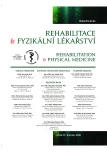-
Medical journals
- Career
Physiotherapy - an Integral Part of Patient Management after Total Hip Arthroplasty
Authors: M. Vavro 1,2; D. Kollár 3
Authors‘ workplace: Stredná zdravotnícka škola, Nové Zámky 1; Fakulta zdravotníctva a sociálnej práce sv. Ladislava, Nové Zámky 2; Vysoká škola zdravotníctva a sociálnej práce sv. Alžbety, Bratislava 3
Published in: Rehabil. fyz. Lék., 27, 2020, No. 4, pp. 201-204.
Category: Original Papers
Overview
Objective: The pilot study objective was to evaluate the effect of comprehensive post-operative physiotherapeutic treatment on the selected physiotherapeutic parameters after a total hip arthroplasty.
Patients and methods: Forty patients after total hip arthroplasty were enrolled into the pilot study. The patients underwent comprehensive physiotherapeutic treatment to increase muscle strength, range of motion, to reduce post-operative swelling of thighs. Prior to the physiotherapeutic intervention, we carried out the following physiotherapeutic examination for each patient - muscle test, trigonometric examination, measuring the circumference of the lower limbs. To compare the figures, we used statistical tests which were evaluated on the significance level α (p)=0.05.
Results: After completing the physiotherapeutic processes, we have observed among the patients who underwent a total hip replacement surgery, a significant increase in muscle strength as with the flexors as well as the abductors (p = 0.001), improvement in their range of motion in hip joint flexion and abduction in comparison to its range before treatment (p=0.001) and post-operative swelling (p <0.001), respectively.
Conclusion: Early post-operative physiotherapy treatment positively affects patients’ general condition. In addition, it improves muscle strength, range of motion of the operated joint, reduces post-operative swelling.
Keywords:
Total hip arthroplasty – Physiotherapy – muscle strength
Sources
1. BALIK, M. S. et al.: Evaluation of the quality of life and psychiatric symptoms of patients with primary coxarthrosis after total hip arthroplasty. Acta Chirurgiae Orthopaedicae et Traumatologiae Cechoslovaca, 84, 2017, 6, s. 436-440.
2. BARNES, R. Y. et al.: Preoperative education in hip and knee arthroplasty patients in Bloemfontein. South African Journal of Physiotherapy, 74, 2018, 1 s. 1-7.
3. DUNGL, P. a kol.: Ortopedie. Praha, Grada publishing, 2005.
4. ELIBOL, N., UNVER, B., KARATOSUN, V.: Investigation of the effects of balance training on balance and functional status in patients with total hip arthroplasty due to osteoarthritis: a randomised controlled pilot study, 2018, s. 1609-1609.
5. FOLTÍN, M., VAVRO, M., JANKECHOVÁ, M., KOLLÁROVÁ, L.: Komplexná fyzioterapeutická liečba pacienta po implantácii totálnej endoprotézy bedrového kĺbu. Ošetrovateľský obzor, roč. 11, 2014, č. 1-2, s. 29-32. ISSN 1336-5606.
6. HENDERSON, K. G., WALLIS, J. A., SNOWDON, D. A.: Active physiotherapy interventions following total knee arthroplasty in the hospital and inpatient rehabilitation settings: a systematic review and meta-analysis. Physiotherapy, 2017.
7. HOORNTJE, A., JANSSEN, K., BOLDER, S. et al.: The effect of total hip arthroplasty on sports and work participation: a systematic review and meta-analysis. Sports Medicine, 2018, s. 1-32.
8. JÄPPINEN, A. M. et al.: Postoperative patient education in physiotherapy after hip arthroplasty. Patients‘ Perspective. Musculoskeletal Care, 15, 2017, 2, s. 150-157.
9. LEMMEY, A. B., OKORO, T.: The efficacy of exercise rehabilitation in restoring physical function following total hip replacement for osteoarthritis: a review. OA Musculoskeletal Med, 2013, 1 : 13.
10. MATHEIS, C., STÖGGL, T.: Strength and mobilization training within the first week following total hip arthroplasty. Journal of Bodywork and Movement Therapies, 2017.
11. PARK, I., KOEHLE, M., DEVEZA, L. R.: Total hip replacement surgical guide tool. U.S. Patent, 2018, 9,901, s. 404.
12. PUMBERGER, M. et al.: Microstructural changes of tensor fasciae latae and gluteus medius muscles following total hip arthroplasty:.A Prospective Trial. Acta Chirurgiae Orthopaedicae et Traumatologiae Cechoslovaca, 84, 2017, s. 97-100.
13. RAJU, K. P. et al.: Comparison between physiotherapeutic alone and combined physiotherapeutic and pharmacological measures in deep venous thrombosis prophylaxis in joint replacement and spinal surgeries. International Journal of Orthopaedics, 2017, 3.4, s. 845-848.
14. VAVRO, M., ŽIAKOVÁ, E., GAZDÍKOVÁ, K., FARKAŠOVÁ, D.: Does standard post-operative rehabilitation have its place after total knee replacement?. Bratislavske lekarske listy, 117, 2016, 10, s. 605-608.
15. VAVRO, M.: Fyzioterapia u pacientov po totálnej endoprotéze kolenného kĺbu. In Fyzioterapia pri vybraných ochoreniach, Bratislava, Slovenská zdravotnícka univerzita, 2017. 1. vyd. 184 s. ISBN 978-80-89702-47-3.
16. VAVRO, M.: Včasná fyzioterapia u pacientov po implantácii totálnej endoprotézy bedrového kĺbu. In Ošetrovateľský obzor, roč. 10, 2013, č. 3, s. 50-53. ISSN 1336-5606,
17. VAVRO, M., KRESÁNEK, J.: Hodnotenie svalovej sily u pacientov po totálnej endoprotéze bedrového kĺbu. In Jihlavské zdravotnícke dny 2014 [CD - ROOM]. IV ročník, Jihlava: Vysoká škola polytechnická, 2014, s. 458-465. ISBN 978-80-87035-85-6.
18. VAVRO, M., GAZDÍKOVÁ, K.: Efekt včasnej fyzioterapie na zvýšenie svalovej sily po totálnej endoprotéze bedrového kĺbu. In Fyzioterapia – vzdelávanie a prax. Bratislava : Slovenská zdravotnícka univerzita, 2015, s. 304-310. ISBN 978-80-89702-19-0.
19. WIJNEN A., BOUMA, S., SEEBER, G. H. et al.: The the-rapeutic validity and effectiveness of physiotherapeutic exercise following total hip arthroplasty for osteoarthritis: A systematic review. PloS one, 2018, 13.3: e0194517.
Labels
Physiotherapist, university degree Rehabilitation Sports medicine
Article was published inRehabilitation & Physical Medicine

2020 Issue 4-
All articles in this issue
- Occurrence of Insufficience of Fixation of Blades and Flat Foot in the Context of Screening for Postural Disorders in Younger School Age
- Physiotherapy - an Integral Part of Patient Management after Total Hip Arthroplasty
- Present-day Infertility Treatment and the Role of Physiotherapy
- Gluteal Tendinopathy and How to Possibly Influence It
- Upper Extremity Injuries Among Golf Players
- Injuries of Achilles Tendon
- Rehabilitation & Physical Medicine
- Journal archive
- Current issue
- Online only
- About the journal
Most read in this issue- Injuries of Achilles Tendon
- Gluteal Tendinopathy and How to Possibly Influence It
- Present-day Infertility Treatment and the Role of Physiotherapy
- Occurrence of Insufficience of Fixation of Blades and Flat Foot in the Context of Screening for Postural Disorders in Younger School Age
Login#ADS_BOTTOM_SCRIPTS#Forgotten passwordEnter the email address that you registered with. We will send you instructions on how to set a new password.
- Career

